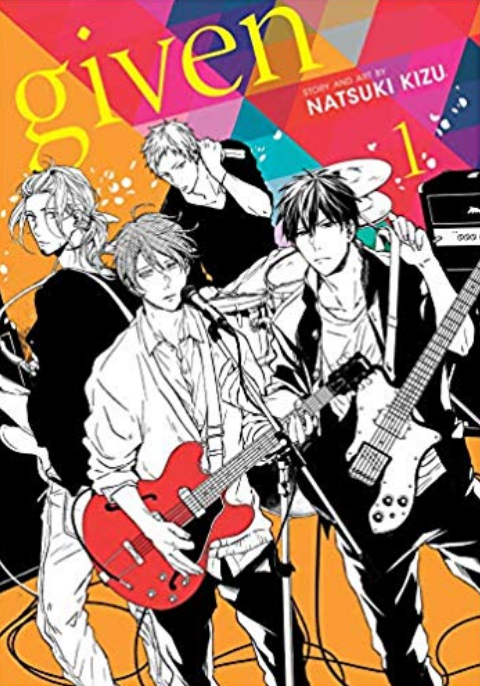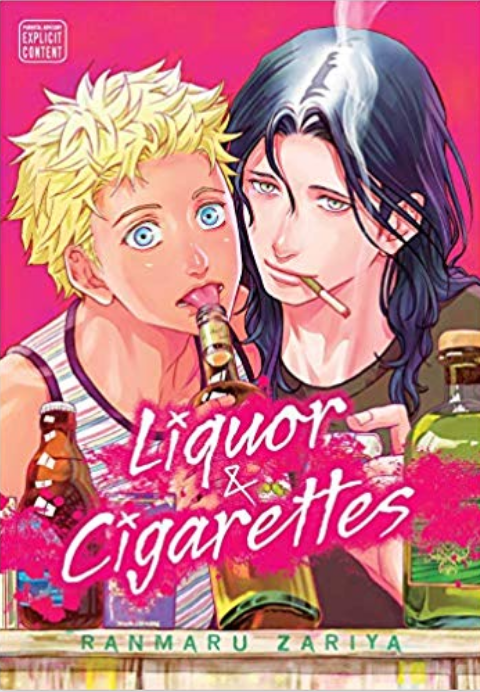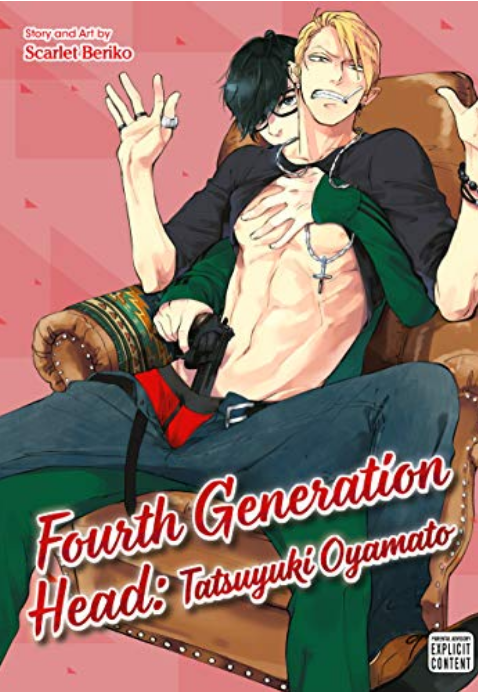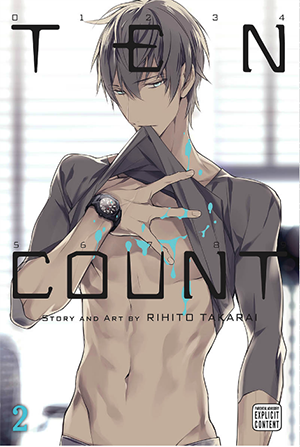Given Volume 1 by Natsuki Kizu
Even before I read this manga, I remember scrolling past something on twitter and seeing the cover. Who is the mildly cranky guitarist? What’s up with the diffident dude with the red guitar? Has there been yaoi manga translated here featuring a rock band since Gravitation? I have no idea, but I was more than ready to check out this series.
Uneoyama is a cranky high school student and guitar player who is quite irked to see another boy passed out holding a guitar in his favorite sleeping spot. Uneoyama is perturbed that the guy is clutching a Gibson with rusted out strings, but the mysterious boy says “Can this be fixed?” with a look of desperation on his face. Uneoyama quickly tunes the guitar, strums a cord, and is promptly asked for guitar lessons. Uneoyama isn’t sure how to teach an absolute novice the guitar, but his newfound companion tags along to band practice and introduces himself as Mafuyu Sato. Mafuyu meets bassist Haruki and drummer Kaji, and continues to be relentless about asking Uneoyama for guitar lessons.
Throughout most of this first volume, Mafuyu is presented as an innocent enigma, but as Uneo gets to know him he begins to discover that Mafuyu’s emotional attachment to the Gibson he can’t play is rooted in a tragic event from his past. Uneoyama’s jaded attitude towards music is gradually changed by Mafuyu’s enthusiasm and he begins to think about his mysterious new friend more and more. Given perfectly executes the “I’m mad at you because you are so pretty” trope that is so enjoyable when done well. The scenes of the band playing music are dynamic, and Uneoyama’s growing feelings are built up in a subtle way even though he’s not yet ready to be honest with himself. Haruki and Kaji also have some cute scenes together, and as older band members spend a bit of time being amused at Uneoyama actually feeling off-kilter due to the fact that he is finally emotionally invested in something. Kizu’s character designs are all distinct and stylish, and I enjoyed the bonus illustrations of all the major characters that showed sketches of facial expressions as well as vital statistics. This was an extremely promising first volume, and I’m expecting this series will continue to entertain with a winning combination of slow burn romance and music.



 Shirotani is a lifelong germaphobe, resigned to his condition, though it keeps him isolated from others. Fortunately, with the help of his understanding employer, he is able to tolerate his job as secretary to a corporate CEO. It is in the corporate line of duty, then, that he first meets Kurose, a therapist at a local mental health clinic. Kurose notices Shirotani’s condition immediately, and suggests he seek help, but though Shirotani is able to make his way to the clinic, he can’t bring himself to go inside. Acknowledging this difficulty, Kurose offers to help him in a non-clinical capacity, as a friend, an arrangement to which Shirotani eventually agrees. As Kurose slowly helps him accomplish progressively difficult tasks (touching a doorknob with his bare hand, buying a book from a bookstore), the two become close in ways that complicates their relationship and threatens the fragile boundaries between them.
Shirotani is a lifelong germaphobe, resigned to his condition, though it keeps him isolated from others. Fortunately, with the help of his understanding employer, he is able to tolerate his job as secretary to a corporate CEO. It is in the corporate line of duty, then, that he first meets Kurose, a therapist at a local mental health clinic. Kurose notices Shirotani’s condition immediately, and suggests he seek help, but though Shirotani is able to make his way to the clinic, he can’t bring himself to go inside. Acknowledging this difficulty, Kurose offers to help him in a non-clinical capacity, as a friend, an arrangement to which Shirotani eventually agrees. As Kurose slowly helps him accomplish progressively difficult tasks (touching a doorknob with his bare hand, buying a book from a bookstore), the two become close in ways that complicates their relationship and threatens the fragile boundaries between them.  MICHELLE: Another thing that strikes me about the questions Kurose poses is how detached and clinical they can seem, even after a sexual act. One example is, “Were you more concerned with the possibility that I found you unpleasant than whether or not you found the situation itself unpleasant?” Leaving aside the tacit admission that he knows Shirotani could’ve been finding the situation unpleasant, attempting to reassert the therapist/patient dynamic at such a moment is, well, kind of creepy.
MICHELLE: Another thing that strikes me about the questions Kurose poses is how detached and clinical they can seem, even after a sexual act. One example is, “Were you more concerned with the possibility that I found you unpleasant than whether or not you found the situation itself unpleasant?” Leaving aside the tacit admission that he knows Shirotani could’ve been finding the situation unpleasant, attempting to reassert the therapist/patient dynamic at such a moment is, well, kind of creepy. MJ: As BL discussions have cropped up in comments over the past couple of weeks, both in the
MJ: As BL discussions have cropped up in comments over the past couple of weeks, both in the  I’m inclined to believe it’s a little of both, and I agree pretty strongly on the first bit. Though I haven’t been a fan of SuBLime’s licenses, they crush DMP so far in terms of both visual quality and ease of delivery. While manga delivered by way of DMP’s iPad app looks like a million bucks, their Kindle releases are far from it (see
I’m inclined to believe it’s a little of both, and I agree pretty strongly on the first bit. Though I haven’t been a fan of SuBLime’s licenses, they crush DMP so far in terms of both visual quality and ease of delivery. While manga delivered by way of DMP’s iPad app looks like a million bucks, their Kindle releases are far from it (see  MICHELLE: My experience is pretty different, as I own neither smartphone nor tablet. All I have is a Kindle—which, as mentioned, is useless for manga—and a personal computer. Still, I am not peeved at all by the move toward digital distribution.
MICHELLE: My experience is pretty different, as I own neither smartphone nor tablet. All I have is a Kindle—which, as mentioned, is useless for manga—and a personal computer. Still, I am not peeved at all by the move toward digital distribution. My greatest BL highlight of the year was absolutely JManga’s release of Setona Mizushiro’s
My greatest BL highlight of the year was absolutely JManga’s release of Setona Mizushiro’s  Speaking of Kinoshita, she’s been a favorite of mine since I read the first volume of Kiss Blue several years ago, but her work is suddenly all over the place here, thanks mainly to the Digital Manga Guild, who brought us (among others)
Speaking of Kinoshita, she’s been a favorite of mine since I read the first volume of Kiss Blue several years ago, but her work is suddenly all over the place here, thanks mainly to the Digital Manga Guild, who brought us (among others)  Like you, most of SuBLime’s licenses don’t really appeal to me, but that doesn’t mean I haven’t been able to find titles to enjoy.
Like you, most of SuBLime’s licenses don’t really appeal to me, but that doesn’t mean I haven’t been able to find titles to enjoy.  In my review, I wrote, “There are so many things to recommend this manga. The atmosphere is sort of… elegant and languid, which suits mysterious Mizuki well and makes an earnest everydude like Asada stand out all the more. The growing friendship between the men is believable—and they’re both completely professional adults, I might add—as is Mizuki’s wary reaction when Asada confesses his feelings.. It’s lovely and complicated, and when the guys do finally get together physically it’s wonderfully awkward.”
In my review, I wrote, “There are so many things to recommend this manga. The atmosphere is sort of… elegant and languid, which suits mysterious Mizuki well and makes an earnest everydude like Asada stand out all the more. The growing friendship between the men is believable—and they’re both completely professional adults, I might add—as is Mizuki’s wary reaction when Asada confesses his feelings.. It’s lovely and complicated, and when the guys do finally get together physically it’s wonderfully awkward.”


